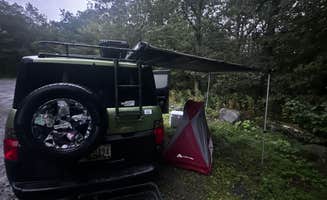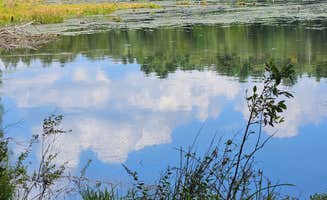Dispersed camping near Dalton, Pennsylvania encompasses several remote forest locations across the Northeastern Appalachian foothills. The area features mixed hardwood forests with elevations ranging from 1,200 to 1,800 feet, creating varied terrain for primitive camping experiences. Winter temperatures frequently drop below freezing from November through March, requiring campers to prepare for seasonal challenges when visiting these undeveloped sites.
What to do
Hiking trail exploration: Thunder Swamp Trailhead connects to multiple wilderness trails with varying difficulty levels. "It's a gravel parking lot. Plenty of shade. No one bothered me," reports Benjamin H. about the trailhead base camp area.
Fishing opportunities: Hickok Brook offers limited fishing access for those willing to hike in their equipment. "Really is a nice quiet place. It's Labor Day weekend, see how many people try to cram in to the very limited camping area," notes Gregg T. about the location's popularity during peak times.
Wildlife observation: Early mornings at these primitive sites provide opportunities to spot native Pennsylvania wildlife. Corey mentions Hickok Brook is "Very gorgeous but not RV friendly," highlighting its natural appeal despite access limitations.
What campers like
Solitude and quiet: The remote nature of these dispersed sites creates peaceful camping conditions away from crowds. One camper at Thunder Swamp notes, "Trailhead parking was chill for a night. No trouble. Tons of hiking. Went down Saw Creek trail to a marsh."
Natural water features: Several primitive camping sites near Dalton provide access to streams, ponds or lakes. "Where I originally camped was not a spot, according to Ranger. Had to move next to the lake. Need a permit on NY state land," explains Gregg T. about proper camping locations at Hickok Brook.
No reservation requirements: Most primitive sites operate on first-come basis, though permits may be required. At Beals Pond State Forest, Joshua M. reports, "This state forest is beautiful but not easily accessible in the winter."
What you should know
Road conditions: Access routes often require high-clearance vehicles or hiking in. "The road is very rough with huge potholes so good clearance is a must. It's not a good spot for car camping," warns Corey about Hickok Brook access.
Permit requirements: New York State forest lands require camping permits. "Contact Rangers office of whatever county," advises a Hickok Brook visitor regarding proper permission for overnight stays.
Limited amenities: Expect no facilities at these primitive camping locations. "Bring everything with you. It's a hike back to town... there is a small town 10 minutes away. Eldred, NY," notes a Hickok Brook camper about supply logistics.
Tips for camping with families
Site selection considerations: Choose locations with level ground for tent placement. At Hickok Brook, one visitor noted, "You could conceivably drive up to the spots and pull off the road to put up a small tent somewhere."
Distance from supplies: Plan for complete self-sufficiency or know the nearest resupply options. "There is a small town 10 minutes away," mentions Gregg T. about Hickok Brook's proximity to limited services.
Weather preparedness: Mountain weather patterns change quickly, requiring appropriate gear. Thunder Swamp visitors note shade availability at the trailhead, which can provide relief during summer months.
Tips from RVers
Vehicle restrictions: Most dispersed camping sites near Dalton have significant access limitations for larger vehicles. "I drove in thinking that there would be flat places to park a very rugged camper in my full ton diesel pickup," reports Corey about Hickok Brook, highlighting misconceptions about access.
Cell service limitations: Communication challenges affect emergency preparedness and navigation. One Beals Pond State Forest visitor reported being "unable to get cell reception with Verizon" during their stay.
Seasonal road closures: Winter access becomes particularly challenging at most sites. Joshua M. notes that at Beals Pond State Forest, "After a certain point, the road is not maintained in the winter," requiring alternative planning during colder months.



